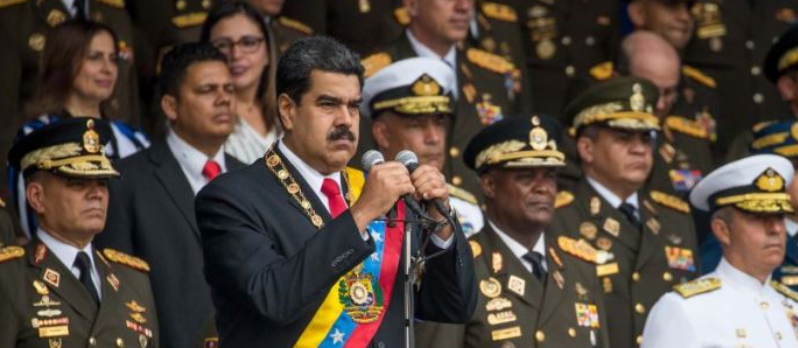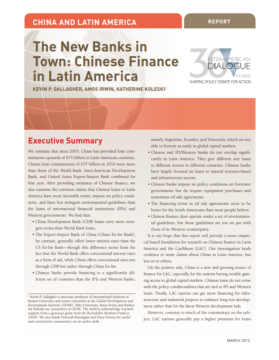Hugo Stay Home
Hugo Chavez, the Venezuelan president, has clearly been enticed by the Libyan drama, where his longtime friend and ally, Muammar al-Qaddafi, is under siege from rebel forces.
A Daily Publication of The Dialogue
Venezuelan President Nicolás Maduro has accused leading opposition lawmakers, Colombia’s government and financial backers in the United States of having a role in what Venezuela claims was an attempt to assassinate Maduro and military leaders with armed drones at a public event on Aug. 4. Authorities have made some arrests in the case, but it remains to be proven publicly who orchestrated the attack. Has the attempt on Maduro’s life strengthened his support base, or did it embolden the opposition? What are the biggest takeaways from the drone bomb incident?
R. Evan Ellis, Latin America research professor at the U.S. Army War College Strategic Studies Institute: “There are multiple possibilities for what actually happened in the drone incident, but all will likely embolden the opposition and accelerate maneuvering among regime power brokers and Venezuela’s extra-hemispheric partners. The only certainty is that government claims do not make sense, including that a sharpshooter blew up the drone in the air (‘C-4,’ if the material used, is stable and probably wouldn’t explode from a bullet, as the drone did). The drone’s flight path, apparently hovering vulnerably a safe distance from the president (in view of the crowds), rather than racing in the final critical meters, is also suspicious, as is the rapidity with which Venezuelan authorities produced alleged perpetrators and other details. The regime may have staged the attack to rally supporters, round up opponents and discredit the opposition (having already accused exiled opposition figure Julio Borges of involvement). If so, such effects will be minimal, since regime opponents and supporters are already too polarized to be persuaded by such accusations. Yet if the attack was indeed by Maduro’s enemies (whether the in political opposition, the military, Havana or in his own government), it suggests that they are now willing to shake up the status quo. Alternatively, figures such as Diosdado Cabello or the Cubans may be pressuring Maduro to be more compliant, reminding him that he only survives by their goodwill. The Russians and the Chinese are also likely to be attentive to such messages, suggesting the delicate equilibrium in the regime is now unstable, and they need to talk further with those behind the throne.”
Eva Golinger, attorney, author and former advisor to late Venezuelan President Hugo Chávez:“First and foremost, the international community should universally condemn the use of armed drones to attempt an assassination of an elected head of state. No matter the position on Maduro’s presidency, a targeted attack on a president using drones armed with explosives sets an abhorrent and terrifying precedent that should be unequivocally denounced and rejected by every government, national and international organization that purports to support democracy, rule of law and peace. Killing the president is not the way to resolve a political and economic crisis. In fact, it may make the situation much worse. Already, many influential figures in Venezuela who were previously supportive of the Chávez government and had distanced themselves from Maduro are unifying around him and the government after this attack. There is nothing better to strengthen a failing government and unite a country in crisis than a war or external threat of violence. The drone attacks appear to have been carried out by a fringe anti-government faction without a clear plan for the fallout. This again shows the desperation and weakness of the opposition and its failure to create an alternative proposal of governance that could garner widespread support. While the drone attack may have revealed vulnerabilities of the Maduro government, he will justifiably use the incident to prove to the world he was right: the opposition is undemocratic and violent, and does not operate with a framework of democracy. The only way out of Venezuela’s crisis will be through a democratic process with a viable leadership comprised of representatives from the differing political factions in the country, including ‘chavismo.’ ”
Gustavo Roosen, member of the Advisor board and president of IESA in Caracas: “The civil-military government of Nicolás Maduro has the support of the high command of the Venezuelan Armed Forces. The ruling PSUV party demonstrates, at each step, a growing fracture and mismatch between the fundamental leaders of ‘chavismo-madurismo.’ The latest survey conducted by Consultores 21, a respected firm, shows 60 percent of the population is pessimistic with regard to the country’s future, the highest level of pessimism since comparable polls started almost 30 years ago. Seventy-three percent of the population identifies the country’s economic problems as the most serious issue, with expectations for them to worsen. More than 50 percent of Venezuelans eat just twice a day or less, and 54 percent say they receive or have received help from the government. This help generates a sort of ‘utilitarian’ support for Maduro of around 20 percent of the population. Just like Cuba’s Castro brothers, the ideological mentors of the regime, this government uses events such as the drone incident to drive support in its favor. Given the country’s circumstances, an increase in government support will be temporary. What will be more definitive is the growing penalization of opposition leaders who find themselves in a sort of disbanding due to repeated accusations, harassment and aggressions against them, including imprisonment. Blaming two strong nations such as Colombia and the United States as architects or perpetrators of the attack adds a dramatic tinge to the subject, with the sole purpose of ensuring solidarity among Venezuelan citizens.”
Steve Ellner, former professor of economic history and political science at the Universidad Oriente in Venezuela“The first step in analyzing the Venezuelan drone incident is separating what we know from what we don’t. Unfortunately, much of the media and many political actors have not been rigorous in striving to achieve objectivity. As a result of their partiality, the event has ended up emboldening followers on both sides in Venezuela. Abundant evidence indicates that the attack was not staged by Maduro. Various people have taken credit for it (such as former Police Chief Salvatore Lucchese) or recognized that they knew about it beforehand (such as Miami-based TV host Jaime Bayly). That such an action was carried out should not be surprising given the barrage of threats of military intervention, support for a military coup and the like coming from powerful U.S. actors (President Trump and Senator Marco Rubio, for example)—statements that invigorate Venezuelan government adversaries who contemplate extra-legal tactics. Furthermore, anti-Chavistas have engaged in violence to achieve regime change on numerous occasions. We don’t know all the specifics of who organized the attempted drone attack. But statements coming from the United States and the European Union, and the wording used by the commercial media, indicate doubts as to whether government adversaries were behind it. In sharp contrast with reporting on terrorist activity elsewhere, the printed media consistently places quotation marks around the term ‘assassination attempt.’ The narrative that blames Maduro for the incident encourages radicalization. But Venezuelan independents, who generally reject both Maduro and the opposition, condemn the attempt and support the government’s side, as they have in response to the U.S.-imposed financial embargo and other actions by international actors, an observation recently made by Venezuelanalysis reporter Paul Dobson.”
Editor’s note: In a statement to the Advisor, Venezuela’s foreign ministry said in part, “Regarding the participation of Venezuelan extreme right-wing, we declare that this time these elements of the violent opposition have gone too far. They could have caused numerous deaths that would have led to the most serious of consequences for the country’s stability. The government of Venezuela has demanded that the attorney general carry out a deep investigation to clarify the truth. Venezuela will use national and international law to pursue and bring the authors of this abominable attempt to justice. The Venezuelan state is carrying out an extensive and impartial investigation that will guarantee the application of justice and the maximum penalty allowed for those responsible. The attempted assassination of a president cannot be pardoned.” The full statement is posted here.
The Latin America Advisor features Q&A with leaders in politics, economics, and finance every business day. The publication is available to members of the Dialogue's Corporate Program and others by subscription.
Hugo Chavez, the Venezuelan president, has clearly been enticed by the Libyan drama, where his longtime friend and ally, Muammar al-Qaddafi, is under siege from rebel forces.
Estimates of the volume, composition, and characteristics of Chinese lending to the region since 2005.
Is the Venezuelan government likely to comply with the IACHR’s ruling or will it uphold the ban?
 Maduro // File Photo: Venezuelan Government.
Maduro // File Photo: Venezuelan Government.
